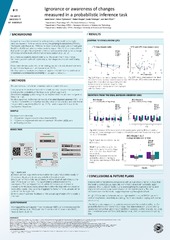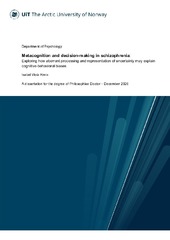Blar i forfatter "Kreis, Isabel Viola"
-
Ignorance or awareness of changes measured in a probabilistic inference task
Kreis, Isabel Viola; Tjelmeland, Håkon; Biegler, Robert; Tröbinger, Luzia Rosa; Pfuhl, Gerit (Conference object; Konferansebidrag, 2017)A cognitive bias often reported for schizophrenia is the tendency to make decisions based on little evidence, namely the jumping to conclusions (JTC) bias. The beads task (Huq et al., 1988) is the most commonly used task to investigate the JTC and different attempts were made to explain the JTC. One proposition is that patients might miscomprehend the task and assume volatility, i.e. a change of ... -
The interplay between executive control, behavioral variability and mind wandering: Insights from a high-definition transcranial direct-current stimulation study
Boayue, Nya Mehnwolo; Csifcsak, Gabor; Kreis, Isabel Viola; Schmidt, Carole; Finn, Iselin Caroline; Vollsund, Anna Elfrida Hovde; Mittner, Matthias (Journal article; Tidsskriftartikkel; Peer reviewed, 2020-11-21)While the involvement of executive processes in mind wandering is largely undebated, their exact relationship is subject to an ongoing debate and rarely studied dynamically within‐subject. Several brain‐stimulation studies using transcranial direct current stimulation (tDCS) have attempted to modulate mind‐wandering propensity by stimulating the left dorsolateral prefrontal cortex (DLPFC) which is ... -
Metacognition and decision-making in schizophrenia: Exploring how aberrant processing and representation of uncertainty may explain cognitive-behavioral biases
Kreis, Isabel Viola (Doctoral thesis; Doktorgradsavhandling, 2021-04-13)The cognitive profile associated with schizophrenia has long been a research subject of interest. A plethora of studies have not only revealed cognitive deficits but also cognitive biases, meaning qualitative deviations in the way information is processed and evaluated. Such biases are for example reflected in findings of diminished metacognitive accuracy, or premature and disadvantageous decision-making. ... -
Objective Versus Subjective Effort in Schizophrenia
Kreis, Isabel Viola; Moritz, Steffen; Pfuhl, Gerit (Journal article; Tidsskriftartikkel; Peer reviewed, 2020-07-09)<i>Background and Objectives</i>: Performance on cognitive tasks is often impaired in individuals with schizophrenia (SCZ), possibly resulting from either cognitive deficits (e.g., limited working memory capacity) or diminished mental effort or both. Investment of mental effort itself can be affected by cognitive resources, task load, and motivational factors and has thus proven difficult to measure. ... -
Overestimation of volatility in schizophrenia and autism? A comparative study using a probabilistic reasoning task
Kreis, Isabel Viola; Biegler, Robert; Tjelmeland, Håkon; Mittner, Matthias; Reitan, Solveig Merete Klæbo; Pfuhl, Gerit (Journal article; Tidsskriftartikkel; Peer reviewed, 2021-01-07)<i>Background and objectives</i> - A plethora of studies has investigated and compared social cognition in autism and schizophrenia ever since both conditions were first described in conjunction more than a century ago. Recent computational theories have proposed similar mechanistic explanations for various symptoms beyond social cognition. They are grounded in the idea of a general misestimation ... -
Probabilistic inference in psychosis and autism
Kreis, Isabel Viola; Sandvik, Kristin; Tjelmeland, Håkon; Biegler, Robert; Pfuhl, Gerit (Conference object; Konferansebidrag, 2017)Within the predictive coding framework the brain is defined as an inference machine that continuously tries to predict its sensory inputs on the basis of beliefs about the world and updates those beliefs in the presence of contradictory sensory data (i.e. prediciton errors; Friston, 2005). Neurobiologically, the weighting and further processing of those prediction errors is thought to be influenced ... -
Psychosis and Psychotic-Like Symptoms Affect Cognitive Abilities but Not Motivation in a Foraging Task
ten Velden Hegelstad, Wenche; Kreis, Isabel Viola; Tjelmeland, Håkon; Pfuhl, Gerit (Journal article; Tidsskriftartikkel; Peer reviewed, 2020-07-31)<i>Background and Objective</i>: Goal-directed behavior is a central feature of human functioning. It requires goal appraisal and implicit cost-benefit analyses, i.e., how much effort to invest in the pursuit of a certain goal, against its value and a confidence judgment regarding the chance of attainment. Persons with severe mental illness such as psychosis often struggle with reaching goals. ... -
Spared performance but increased uncertainty in schizophrenia: Evidence from a probabilistic decision-making task
Kreis, Isabel Viola; Zhang, Lei; Moritz, Steffen; Pfuhl, Gerit (Journal article; Tidsskriftartikkel; Peer reviewed, 2021)Aberrant attribution of salience to in fact little informative events might explain the emergence of positive symptoms in schizophrenia and has been linked to belief uncertainty. Uncertainty is thought to be encoded by neuromodulators, including norepinephrine. However, norepinephrinergic encoding of uncertainty, measured as task-related pupil dilation, has rarely been explored in schizophrenia. ...


 English
English norsk
norsk






